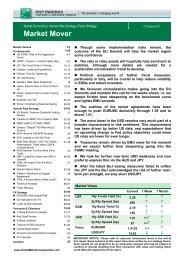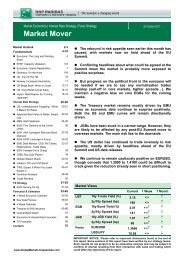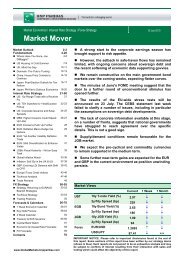Market Economics | Interest Rate Strategy - BNP PARIBAS ...
Market Economics | Interest Rate Strategy - BNP PARIBAS ...
Market Economics | Interest Rate Strategy - BNP PARIBAS ...
You also want an ePaper? Increase the reach of your titles
YUMPU automatically turns print PDFs into web optimized ePapers that Google loves.
Japan: Rising Chance of Sales Tax Hike?<br />
• Support within the government for a<br />
consumption tax hike has been increasing.<br />
• Many in the government seem to be coming<br />
around to the idea that it cannot come up with a<br />
credible plan for social security reform unless it<br />
starts talking about raising consumption tax.<br />
• Meanwhile, public opinion on the tax is<br />
changing, with more people now opposing<br />
Hatayama’s “no hike” stance than supporting it.<br />
• The conventional wisdom that the<br />
consumption tax is a taboo at election time<br />
might not hold this time around.<br />
Support within the government for a tax hike<br />
Lately there seems to be growing support within the<br />
government for a consumption tax hike. Although<br />
Prime Minister Hatoyama himself has not abandoned<br />
his opposition to raising the tax anytime during the<br />
current four-year term of the Lower House (which<br />
expires in the summer of 2013), successive cabinet<br />
ministers, beginning with National Policy Minister<br />
Sengoku, have been voicing support for a tax hike<br />
ever since Finance Minister Kan announced in<br />
February that discussions on this issue would begin<br />
at an early date. Indeed, in a move apparently laying<br />
the groundwork for a future tax hike, Finance Minister<br />
Kan on 26 April convened the Fiscal System Council<br />
for the first time in roughly 15 months, and named as<br />
its new chairman Tokyo University Professor Hiroshi<br />
Yoshikawa. The latter is a proponent of raising the<br />
consumption to secure a permanent source of<br />
funding for social security. Even so, there are doubts<br />
that the government will actually produce concrete<br />
plans for raising the consumption tax prior to the<br />
Upper House election slated for July.<br />
Credibility for social welfare reform ahead of<br />
election<br />
That the government is taking up this issue at this<br />
juncture reflects more than just renewed concerns<br />
about Japan’s deteriorating fiscal condition, sparked<br />
by the Greek sovereign crisis, or the economy’s<br />
improved prospects now that the risk of a soft patch<br />
or worse has faded. The government is becoming<br />
increasingly aware that raising the consumption tax<br />
is inevitable, if it is to reform the country’s social<br />
security system. The DPJ rode into power last year<br />
by continually hammering the LDP-led governments<br />
over the past decade on issues related to Japan’s<br />
floundering pension system, from problems with the<br />
120<br />
100<br />
80<br />
60<br />
40<br />
20<br />
Chart 1: General Account Expenditures and<br />
Revenue (JPY trn)<br />
Public bond issuance (% of GDP, RHS)<br />
Expenditures<br />
Tax revenue<br />
0<br />
65 70 75 80 85 90 95 00 05 10<br />
Source: MOF, <strong>BNP</strong> Paribas<br />
Notes: Figures through FY 2008 based on end-of-year financial<br />
statements, FY 2009 includes second supplementary budget, FY 2010 is<br />
government's initial budget.<br />
Chart 2: Public Opinion on Hatoyama's "No Tax<br />
Hike" Stance (%)<br />
60<br />
50<br />
40<br />
30<br />
20<br />
10<br />
0<br />
Jan.Survey Feb. Survey Mar.Survey Apr. Survey<br />
2010<br />
Source: Nikkei Shimubun, TV Tokyo, <strong>BNP</strong> Paribas<br />
Oppose<br />
Approve<br />
Don't know<br />
Social Insurance Agency itself (scandals, misuse of<br />
funds etc) to problems with “lost pension records”<br />
and “pension premium delinquency” of some LDP<br />
officials (some DPJ lawmakers were delinquent too,<br />
but guilty parties in the LDP included several cabinet<br />
ministers). In other words, pension system reform<br />
was one of the key pledges that helped the DPJ win<br />
power. However, unless the party is prepared to talk<br />
about a consumption tax hike, it cannot come up with<br />
a credible reform plan ahead of the Upper House<br />
election (which is shaping up to be an uphill battle for<br />
the DPJ).<br />
Pre-election talk of sales tax used to be taboo<br />
As pointed out in earlier reports, Japan is structurally<br />
prone to running budget deficits because it tries to<br />
maintain “mid-level social welfare” with only “lowlevel<br />
burden-sharing.” The current social welfare<br />
systems (healthcare, pensions) were established in<br />
12<br />
10<br />
8<br />
6<br />
4<br />
2<br />
Ryutaro Kono/ Hiroshi Shiraishi 7 May 2010<br />
<strong>Market</strong> Mover<br />
27<br />
www.Global<strong>Market</strong>s.bnpparibas.com
















